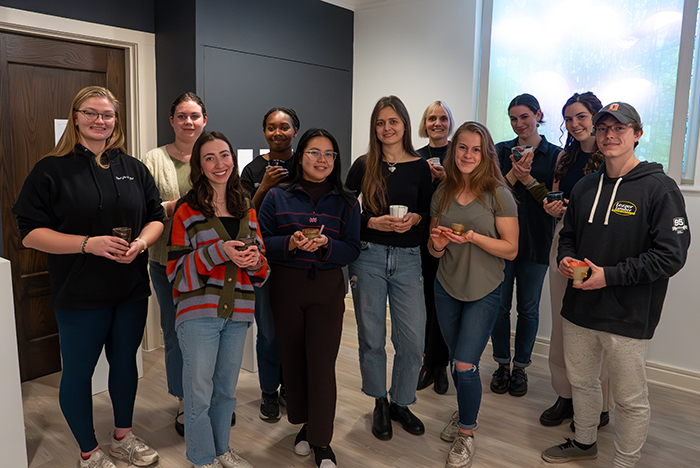Reimagining the Arts With Veronika Yadukha

Artist-in-residence Veronika Yadukha (center), with English majors in Dickinson's 2023-24 senior seminar. Photo by Stephen Munchel.
Yadukha residency focuses on access and the arts
When we think of access to the arts, we typically focus on issues relating to proximity and resource allocation. But there are additional factors that play into who gets to enjoy individual works. After all, to drink in a work of visual art, you must be able to see it. To listen to music, you must be able to hear, and to understand a work of literature, you should know the language in which it’s written.
Is it possible to reimagine works in ways that make them differently accessible? And when and how should artists consider access—and their audiences’ widely varied histories and perspectives—as they create? These questions are central to the work of Veronika Yadukha, a Ukrainian artist, refugee and M.A. fellow of comparative literature at Dartmouth College. And Yadukha is visiting Dickinson to complete a fruitful artistic residency that includes a public exhibition and close interactions with students and faculty.
Beyond the new normal
Yadukha, who fled to the safety of Europe and then America after the outbreak of war in her home country, is visiting Dickinson as the first literary artist to take part in a new residency program. She specializes in intersemiotic translation—transposing an artistic work into a new work of a different art form. Literature, for example, may be translated into a work of music. Visual art may be reinterpreted as theatre or dance.
Her residency is sponsored by Dickinson’s English department, world language departments and art & art history departments as part of the college’s Beyond the New Normal: Disability, Literature and Reimagining Social Justice initiative. Funded by a three-year grant from the Andrew W. Mellon Foundation, the initiative provides for faculty research, curriculum development and academic innovation as well as artistic residencies relating to disability, literature and social justice.
Sonic literature and tactile poetry
While on campus, Yadukha has created and presented ceramic tea bowls and demonstrated musical instruments she created last summer in collaboration with ceramic artists in Oaxaca, Mexico. The instruments are part of an ongoing co-translation of Ukrainian author Sofia Andrukhovych’s novel Amadoka into music. The tea bowls are part of a series representing Zen Buddhist and American counterculture influences in Richard Brautigan’s poetry collection All Watched Over by Machines of Loving Grace.
One of the highlights of her residency is a public exhibition of her literary bowls, on view in Gallery 204 of the Weiss Center for the Arts through Dec. 1. But the beating heart of her visit has been the artist’s interaction with students and faculty members, both outside and inside of class.
Informally, students and faculty have been able to easily chat with Yadukha over a meal, since her residency included an on-campus meal plan. There were also opportunities for students to learn from the artist in more formal settings.
Multiarts connections
During a tea ceremony in Weiss Center for the Arts, English majors in Associate Professor of English Claire Seiler’s senior seminar discovered a tactile and delicious way to experience poetry. While discussing the tea-bowl project with Yadukha, they sipped fragrant, hot tea out of the very bowls she’d made. Assistant Professor of Art & Art History Rachel Eng’s ceramics students likewise learned about Yadukha’s process and work when the artist delivered an in-class workshop and talk. Students in Professor of English Carol Ann Johnston’s visual poetry class will gain new perspectives about the printed word when Yadukha visits their class.
And first-year students in Professor of Music Jennifer Blyth’s seminar on music, water and memory have been thinking through complicated issues with the artist as they gear up for their final project. The students have been imagining how to communicate key moments in regional Black and Indigenous history through artworks and memorials. For their final project, they’re writing applications for a memorial or art piece at LeTort Spring Run.
“[Yadukha] shared her own work as inspiration and led a lot of very in-depth discussions about the difficulty of creating memorial art and all of the lenses that need to be considered,” says Sofia Bischof, a member of the seminar. Those discussions were all the more compelling because they were led by an artist who had grappled with those very issues, adds Eleanor Arcaro-Burbridge '27.
“I definitely benefited from meeting the artist rather than reading about her in a text,” Arcaro-Burbridge says. “Interactive learning is always more fun. I also got to ask her questions and pick her brain about specific details I was interested in.”
The appreciation is mutual. “I am sincerely grateful for the inspiration the conversations with professors and students have given me, and I am impressed by how open the Dickinson community is to different readings of artworks,” Yadukha says. “Their readings are playful yet profound at the same time, which makes me appreciate even more the infinite potential of communication through the language of different art forms.”
TAKE THE NEXT STEPS
Published November 28, 2023